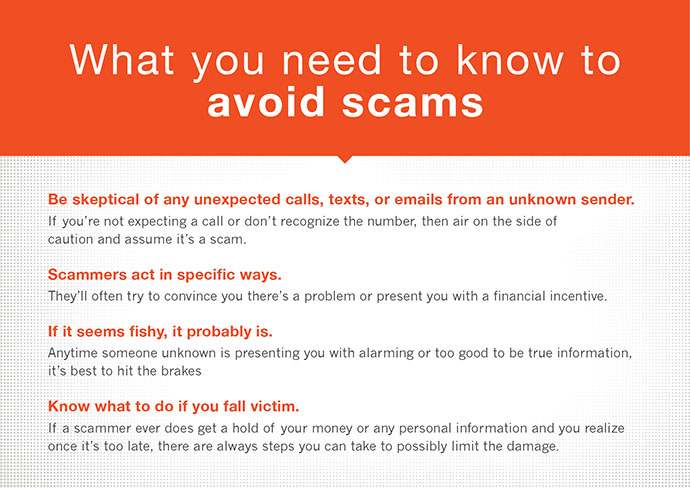Here’s how you can protect yourself from scams
Has an unknown number ever called asking for your Social Security number or other personal information? Or has someone claiming to represent a charity ever texted or emailed you urgently asking for you to send them a check?
If these scenarios sound familiar, you're one of many Americans who are targeted by scammers. In 2024 alone, the Federal Trade Commission reported a big jump in consumer reported fraud scheme losses at a tune of more than $12.5 billion. Imposter scams and online shopping scams were the most common forms of fraud reported.
Scam attempts can appear in several different ways. With this threat to your financial security on the rise and scammers designing new ways to target vulnerable consumers, it's important to be aware of the risk, understand how to identify a scam when you see one, and know what steps you can take if you fall victim.
Let's take a look at what you need to know to avoid scams:

- Be skeptical of any unexpected calls, texts, or emails from an unknown sender. Scam attempts will often appear this way and the sender may claim to be from a government agency (most commonly Social Security, IRS, or Medicare), a business or charity you're familiar with, or a utility company asking for a payment. If you're not expecting a call or don't recognize the number, then air on the side of caution and assume it's a scam. For example, if you typically pay your electric bill online and then one day you get a call from someone claiming to work for the electric company asking for a payment, you should probably hang up.
- Scammers act in specific ways. They'll often try to convince you there's a problem or present you with a financial incentive. The problem could be claiming there's a family emergency or a threat to arrest you or suspend your driver's license. The incentive usually involves a cash prize contingent on you providing them your bank account or other personal information. Furthermore, scammers will often pressure you to act urgently so that you don't have the chance to realize it's not real. They'll also tell you to pay them in a very specific way, such as through a wire transfer or using cryptocurrency. These are all red flags to be on the lookout for.
- If it seems fishy, it probably is. Anytime someone unknown is presenting you with alarming or too good to be true information, it's best to hit the brakes. Look up the name or number of the caller online to see if it's legit, or ask a trusted friend for a second opinion if you're not sure. Ultimately, if you're not 100 percent sure that something is real, you should never give away any financial or personal information.
- Know what to do if you fall victim. If a scammer ever does get a hold of your money or any personal information and you realize once it's too late, there are always steps you can take to possibly limit the damage. If you gave your credit card, bank account, or any other financial information, immediately notify your bank to have your accounts frozen. Depending what information the scammers obtained, you can report fraud to the Social Security Administration, the IRS, or the FTC.
Equipping yourself with knowledge and heightening your awareness of scams is the best way to protect yourself and your financial security. Trust your instincts and always think twice before making any payments online or over the phone.



